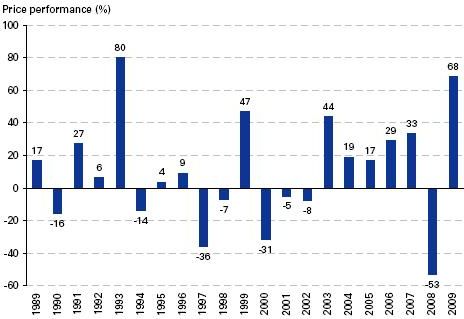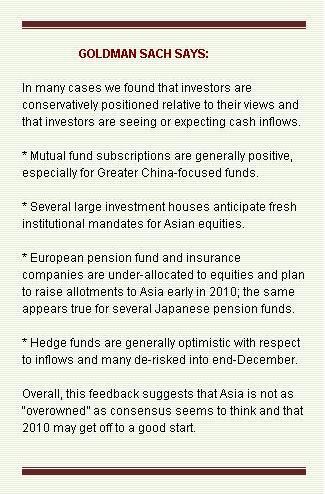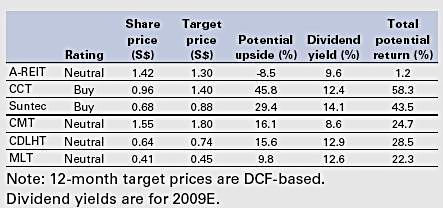
CHINA GETS another “overweight” call from Goldman Sachs for 2010 after the brokerage held over 150 investor meetings in Hong Kong, Europe and the US, and found investors to be “generally positive” on stock market return prospects for the year in Asian region.
The brokerage said it expects 34% usd total returns for Asia this year, propelled primarily by above-consensus earnings growth on improving margins.
“We are overweight China, Taiwan and Korea, and favor tech and consumption/infrastructure sectors. The unifying theme for our market and sector views is under-recognized (and under-priced) growth: China and Taiwan are changing their growth drivers, and tech earnings could be well ahead of consensus,” Goldman said.
It said it expects markets in the region to get off to a good start this year as investors “re-risk."
“In terms of sectors, we think tech has the most upside, and continue to broadly favor domestic demand/infrastructure themes like Chinese steel.”
Goldman Sachs said that its over 150 investor meetings allows it to be “surprisingly positive on Asian markets for 2010, notwithstanding an initial skeptical bias.”
The brokerage cited several reasons why it believes margins in the region will outperform consensus estimates.
“The reasons for this are that a) capacity utilization in Asia is higher than many think which implies more positive operating leverage than consensus expects, and b) there is a rapid adaptive shift in Asian earnings towards EM, which means Asian companies benefit from the 8+% GDP growth in the emerging world and are less hampered by the 2% growth in the developed world.”
It pointed to South Korea as a major beneficiary of the rise of the BRICs (Brazil, Russia, India and China) and the enhanced external demand from these four countries.
“For example, Korea now exports more tech products to the BRICs than it does to the G3, whereas six years ago Korea was selling 5X more to the G3 than the BRICs. This is a staggering adjustment in such a short period.”

Photo: Romil Singh
Investors ‘quite positive’
Goldman Sachs said that reception among investors to its strong 2010 equity return expectations has been “quite positive.”
“Not everyone agrees with everything we are saying – and we would not expect or want this to be the case – but we encountered little vigorous pushback or criticism of our logic.”
Goldman said that in several instances it found that investors were “conservatively positioned” relative to their views and that investors are seeing or expecting cash inflows.
“Mutual fund subscriptions are generally positive, especially for Greater China-focused funds.”
It said many big investment houses expected “fresh institutional mandates” for equities in Asia.
“European pension fund and insurance companies are under-allocated to equities and many plan to raise allotments to Asia early in 2010; the same appears true for several Japanese pension funds. Hedge funds are generally optimistic with respect to inflows and many de-risked into end-December.
“Overall, this feedback suggests that Asia is not as “over-owned” as consensus seems to think and that 2010 may get off to a good start.”

The grass is always greener…
Goldman Sachs said that it found the least bullish sentiment among various investors regarding the markets in which they operate.
“Interestingly, we encountered the greatest resistance to our Korea upgrade from domestic investors in Seoul. We also found more skepticism of our positive China equity views with domestic China accounts than we did with regional investors in Hong Kong, Europe or the US.”
The brokerage also noted a “conservative” sentiment driving most investors, suggesting that the demons of 2008 and much of last year’s economic performance were not fully exorcised, and investors’ most-mentioned downside risks for equity return performance in Asian markets gravitated around these threats.
“The risks that investors most frequently mentioned were a) China inflation and the threat of a sharp policy response (lots of concerns about a mid-year spike); and b) a stronger US dollar and the concern that this could impair Asian equity performance.”
Goldman said that regarding investors anxieties over the possibility of a stronger greenback, it had the following point.
“The inverse correlation over the past two years between the broad dollar index and the Asian equity index does not prove that a rising or falling dollar caused Asian stocks to move in an opposing direction.
“In our view, both assets were responding to the same underlying fundamental drivers, notably the credit crisis and severe economic downturn that sparked a bear market in equities and a flight to liquidity and safety.”
Goldman said that expectations that Asia growth model would fully “de-couple” from external demand (primarily the US) are premature, and there was always an upside to be factored in when the US dollar appreciated, as it spurred Asian exports to its traditional “best customer.”
“Looking forward, if the dollar strengthens because the US economy is stabilizing, this would be positive for global growth and for Asian markets. The relative performance of Asia vs. US equities might be affected by a stronger dollar, but we would still expect very good absolute returns for regional stocks.”
Read NextInsight readers' stockpicks for 2010






